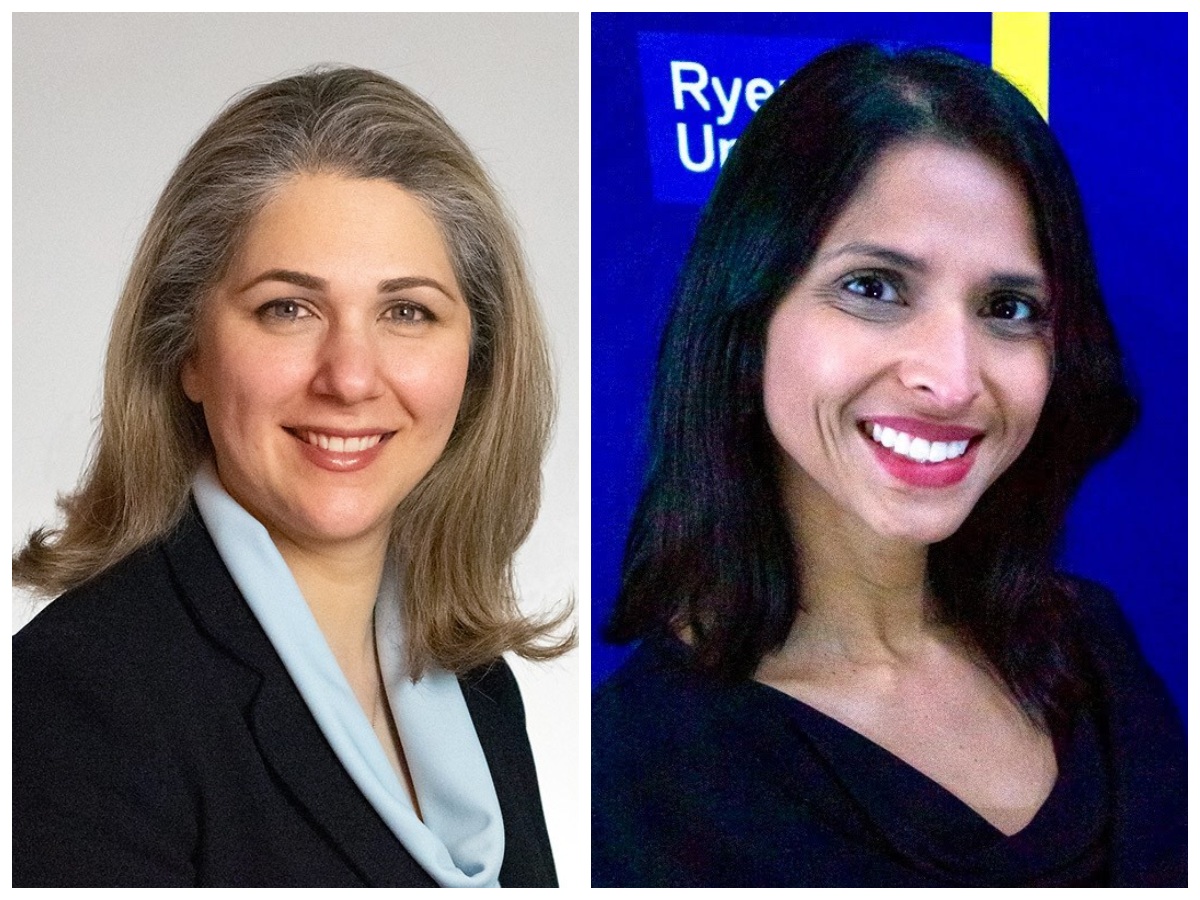Ted Rogers School of Management researchers named Canada Research Chairs

The Ted Rogers School of Management at Ryerson University is now home to three prestigious Canada Research Chairs, the Government of Canada announced (external link, opens in new window) on June 15.
Professors Rupa Banerjee, HR Management and Organizational Behaviour, and Atefeh (Atty) Mashatan, Information Technology Management, were both named to the prestigious program. The Ted Rogers School is already home to Anatoliy Gruzd, who was appointed CRC in Privacy-Preserving Digital Technologies.
The Canada Research Chair program was created to attract and retain a diverse cadre of world-class researchers, to reinforce academic research and training excellence in Canadian post-secondary institutions and help train the next generation of highly skilled people through student supervision, teaching, and the coordination of other researchers' work.
Professor Mashatan will be the new Canada Research Chair in Quality of Security (QoSec) Framework for Internet-of-Things (IoT). Professor Banerjee will be the new Canada Research Chair in Economic Inclusion, Employment and Entrepreneurship of Canada’s Immigrants. This is the first CRC for both professors.
“We are truly thrilled to have our colleagues recognized by the CRC program for their accomplishments and for their promise as emerging scholars,” said Ozgur Turetken, professor and associate dean of research at the Ted Rogers School. “Atty and Rupa not only do rigorous research and produce research output at a high level, but their research programs focus on two very important areas of our society.”
Mashatan’s project will focus on enhancing security measures for emerging technologies. She says existing measures do not appropriately address the security and privacy challenges for every kind of technology. She uses the example of light fixtures, fridges and even security cameras used to regulate a patient’s heartbeat to describe the potential impact of her research.
“These devices are capturing a lot of sensitive information about us and may have safety critical control over our lives. However, given how small these devices have become, the traditional way of securing information may not apply to them. Hence, they become very attractive and attainable targets for an attacker,” explains Mashatan.
She says the problem is that if we make these IoT’s very secure, we may lose some of their functionality and they may even become nonfunctional. Her research project will look at the context of each emerging technology and decide what level of security is appropriate.
“My aim is to establish a Quality of Security (QoSec) framework for IoT that addresses the longevity of data protection, different privacy sensitivity levels of IoT data and decentralizing identity and credential management,” said Mashatan.
Turetken believes that as the prevalence of information and communication technologies keep growing, virtually every member of our society will benefit from Dr. Mashatan’s contributions to cybersecurity knowledge.
Professor Banerjee’s CRC will examine another important area of our society -- immigration.
Her research project will investigate the role that non-state actors such as universities, colleges and employers now play in the immigration system. Banerjee will look at how these actors impact international migrations and integration.
She says that as more immigrants begin working or studying in Canada as temporary residents before becoming permanent residents, employers and post-secondary institutions are increasingly more involved in the immigration selection process.
“I will be examining how our evolving immigration system affects immigrants' economic integration. I am interested in how the shift in the system affects who gets in and how they fare once they arrive,” said Banerjee.
Banerjee says Canada increasingly relies on temporary foreign workers and immigrants to grow its labour force and gaining a deeper understanding of the consequences of the current system could help optimize the positive impacts of immigration.
She hopes her research will provide empirical evidence on best practices, pitfalls and ripple effects of Canada's immigration system.
“I am hopeful that my research will offer insights for employers, government policy-makers, post-secondary institutions and immigrant service providers to make evidence-based decisions on the most effective policies and practices for selecting and integrating newcomers.”
Both researchers are honoured to be receiving CRCs and are looking forward to advancing their research through the program.
“It will allow me to expand the scope of my research program and increase its impact,” said Banerjee. “I also hope to contribute to research leadership at TRSM, with a special focus on the importance of equity, diversity and inclusion within the research process.”
For Turetken, he’s looking forward to the many ways these projects will contribute to the Ted Rogers School’s scholarly activity and knowledge generation, especially as the Ted Rogers School continues to climb international research rankings.
“We are very proud of Drs. Banerjee and Mashatan who, along with our other CRC and endowed chairs, are excellent representatives of the TRSM brand where we strive to engage in socially relevant research.”
Read about all of Ryerson’s grants here (opens in new window) , including Ted Rogers School Professor Deborah Fels receiving a SSHRC Partnership Development Grant and Professors Sameh Al Natour and Oliver Okafor receiving Insight grants.